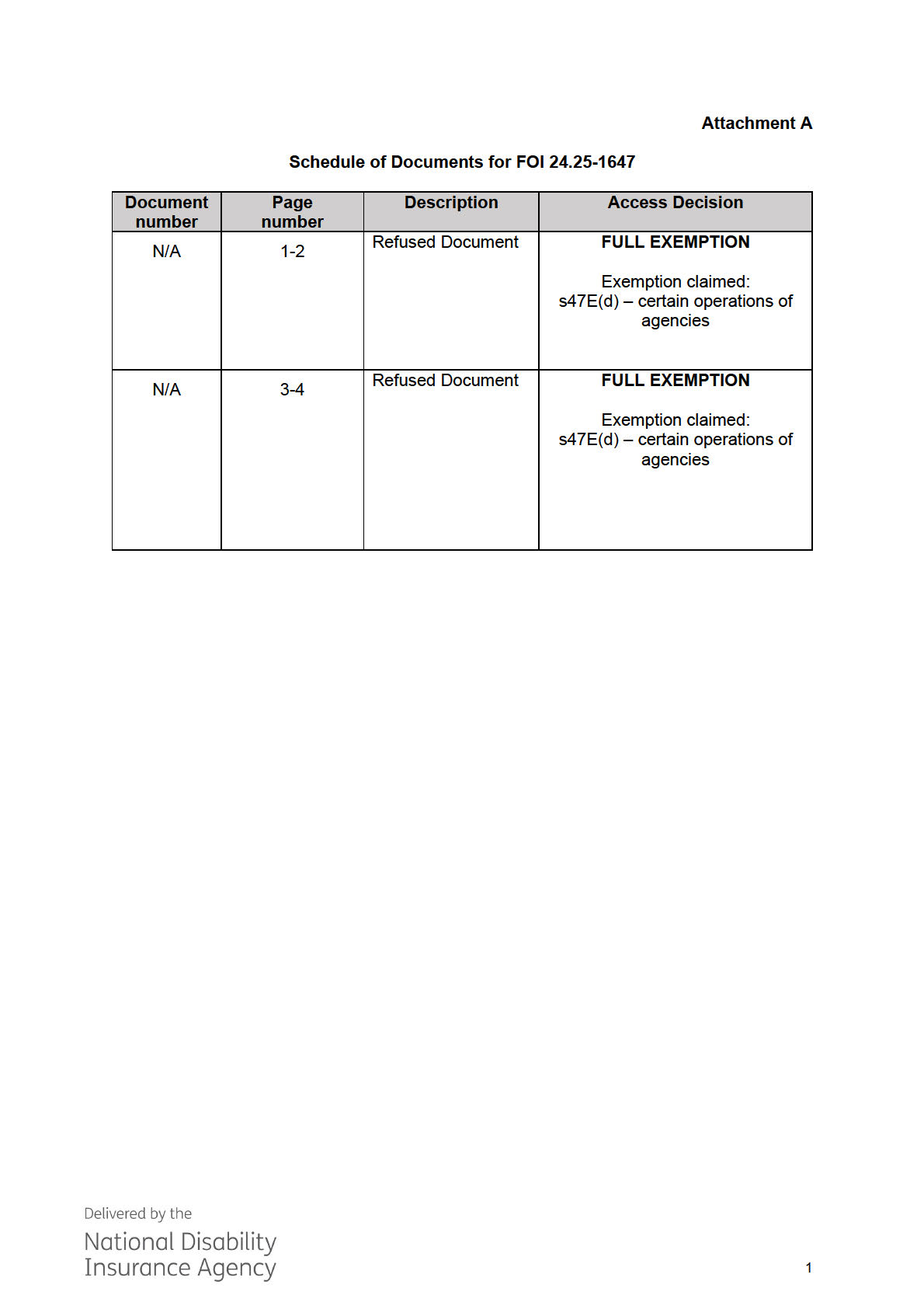
 Our reference:
Our reference: FOI 24/25-1647
GPO Box 700
Canberra ACT 2601
1800 800 110
28 May 2025
ndis.gov.au
Miles
By email: xxxxxxxxxxxxxxxxxxxxxxxxxx@xxxxxxxxxxx.xxx.xx
Dear Miles
Freedom of Information request — Notification of Decision
Thank you for your correspondence of 31 March 2025, in which you requested access to
documents held by the National Disability Insurance Agency (NDIA), under the
Freedom of
Information Act 1982 (FOI Act).
The purpose of this letter is to provide you with a decision on your request.
Scope of your request
You have requested access to the following documents:
…a complete breakdown of the APS Census results only for the Complaints and Freedom of
Information teams from 2023 and 2024.
I request a complete breakdown of each these teams results inclusive of the satisfaction
levels with immediate supervisors and SES managers. Well-being of staff, satisfaction with
the support staff receive from above mentioned management and any results around
unacceptable behaviours in the workplace.
As this team is large and staff names and positions are not required to be disclosed,
anonymity and privacy is stil adhered to with providing these documents…”
Processing Timeframe
In accordance with section 15(5)(b) of the FOI Act, a 30-day statutory period for
processing your request commenced from 1 April 2025. This 30-day period expired
on 1 May 2025.
1
We have been experiencing processing delays and were not able to provide you with our
decision by the due date. Consequently, we are deemed to have refused your application
under section 15AC of the FOI Act. I sincerely apologise for the delay in releasing this
decision to you.
We have continued processing your request. In the interests of not causing any further
delays, I have decided not to apply for an extension to the processing period from the Of ice
of the Australian Information Commissioner (OAIC) under section 15AC of the FOI Act to
protect your internal review rights. However, your right to apply for an external review with
the Of ice of the Australian Information Commissioner remains protected. Please see
Attachment B for more information about your rights of review.
Decision on access to documents
I am authorised to make decisions under section 23(1) of the FOI Act. My decision on your
request and the reasons for my decision are set out below.
I have identified two (2) documents which fall within the scope of your request.
The two (2) documents were identified in consultation with relevant NDIA staff in the People,
Culture and Wellbeing branch who conducted searches of the relevant NDIA’s systems,
using all reasonable search terms that could identify documents within the scope of your
request.
I have decided to refuse access to the two (2) documents in full.
In reaching my decision, I took the following into account:
• your correspondence outlining the scope of your request
• the nature and content of the documents falling within the scope of your request
• the FOI Act
• the FOI Guidelines published under section 93A of the FOI Act
• consultation with relevant NDIA staff
• factors relevant to my assessment of whether or not disclosure would be in the public
interest
• the NDIA’s operating environment and functions.
2
Reasons for decision
Certain operations of agencies (section 47E(d))
Section 47E(d) of the FOI Act conditionally exempts a document if its disclosure would, or
could reasonably be expected to, have a substantial adverse effect on the proper and
efficient conduct of the operations of an agency.
The documents contain information relating to certain operations of the NDIA, specifically the
responses to the annual APS Employee Census 2023 and 2024 (Census) from the
Complaints and FOI teams.
Whilst the NDIA’s usual practice is to release the Census Highlights Report each year, which
can be located at this link: APS Census | NDIS, the documents identified reflects the
responses provided by the individual employees of the Complaints and FOI teams. Staff
participate in the Census on the grounds of anonymity, where the agency collects feedback
and confidential information in relation to issues in the workplace, staff engagement,
wellbeing, innovation and change, communication and leadership.
The disclosure of this information would or could reasonably be expected to jeopardise staff
participation in the Census in the future. It is reasonable to suggest that staff members would
feel that the Agency has not protected their rights to freely express themselves and provide
feedback in an anonymous forum, for fear that this information may be released to the public
through such a process as FOI. Additionally, staff may feel that their work wil be impacted if
members of the public were to read the breakdown of individual team results of the Census
and want to discuss this during routine contacts as part of their usual operations.
It is imperative that Agency staff feel that they can undertake the Census freely each year,
as the information is invaluable in providing insight into our employee’s views about their
work, the Agency, and the APS as a whole. The Census results allow the NDIA to build
operational improvement strategies and improve workforce capabilities, which lead to future
efficiencies and processes to benefit both employees and the public.
Any disclosure resulting in the prejudice of the effectiveness of the Agency’s operational
methods through a process such as the Census would, or could reasonably be expected to,
result in the need for the Agency to need to try and implement other processes to ensure
future staff engagement to openly and wil ingly provide this important feedback, which, in my
3
view, would have a substantial adverse effect on the proper and efficient conduct of the
operations of the NDIA.
Accordingly, I have decided that the document is conditionally exempt under section 47E(d)
of the FOI Act.
Public interest considerations – section 47E(d)
Section 11A(5) of the FOI Act provides that access to a document covered by a conditional
exemption must be provided unless disclosure would be contrary to the public interest.
I have not considered any of the irrelevant factors as set out under section 11B(4) of the FOI
Act in making this decision.
I have considered the factors outlined in section 11B(3) of the FOI Act, and I have
determined that, in favour of disclosure, the relevant information in the document would
promote the objects of the FOI Act by providing access to documents held by the
government and inform debate on a matter of public importance.
Against disclosure, I have considered the factors outlined in paragraph 6.233 of the FOI
Guidelines, and determined that disclosure of the information in the document:
• could reasonably be expected to prejudice an agency’s ability to obtain confidential
information
• could reasonably be expected to prejudice an agency’s ability to obtain similar
information in the future
• could reasonably be expected to harm the interests of an individual or group of
individuals
• could reasonably be expected to prejudice the management function of an agency
Additionally, I find that the release of the document:
• would not contribute to the publication of information of sufficient public interest to justify
the likely harm caused by release
• would not enhance Australia’s representative democracy in the ways described in
section 11B(3) of the FOI Act
• would not inform any debate on a matter of public importance, or promote oversight of
public expenditure.
4

It is in the public interest that the NDIA efficiently and productively undertakes its usual
operations through processes such as the Census, to ensure the ongoing staff engagement
allows the Agency to build operational improvement strategies and improve workforce
capabilities.
I am satisfied, based on the above, that the factors against disclosure of the document
outweigh the factors in favour of disclosure and that, on balance, it would be contrary to the
public interest to release the document to you. Accordingly, I have decided that the
document is exempt under section 47E(d) of the FOI Act.
A Schedule of Documents at
Attachment A, is enclosed.
Rights of review
The due date for a decision on access in relation to your request was 29 September 2024.
As we did not provide you with a decision by the due date, we are deemed to have refused
you access to the documents you have requested (section 15AC of the FOI Act). The effect
of this is that you do not have a right seek an internal review of my decision. I note, however,
that you retain your external review rights.
Your rights to seek a review of my decision, or lodge a complaint, are set out at
Attachment B.
Should you have any enquiries concerning this matter, please do not hesitate to contact me
by email at xxx@xxxx.xxx.xx.
Yours sincerely
Kate (KIM627)
A/Assistant Director – Freedom of Information
Information Release, Privacy and Legal Operations Branch
Reviews and Information Release Division
5

Attachment B
Your review rights
As this matter was a deemed refusal, internal review of this decision is not an option.
However, if you have concern with any aspect of this decision, please contact the NDIA FOI
team by email xxx@xxxx.xxx.xx or by post:
Freedom of Information Section
Complaints Management & FOI Branch
General Counsel Division
National Disability Insurance Agency
GPO Box 700
CANBERRA ACT 2601
Review by the Office of the Australian Information Commissioner
The FOI Act gives you the right to apply to the Office of the Australian Information
Commissioner (OAIC) to seek a review of this decision.
If you wish to have the decision reviewed by the OAIC, you may apply for the review, in
writing, or by using the online merits review form available on the OAIC’s website at
www.oaic.gov.au, within 60 days of receipt of this letter.
Applications for review can be lodged with the OAIC in the following ways:
Online: www.oaic.gov.au
Post:
GPO Box 5218, Sydney NSW 2001
Email:
xxxxxxxxx@xxxx.xxx.xx
Phone:
1300 363 992 (local call charge)
Complaints to the Office of the Australian Information Commissioner or the
Commonwealth Ombudsman
You may complain to either the Commonwealth Ombudsman or the OAIC about actions
taken by the NDIA in relation to your request. The Ombudsman wil consult with the OAIC
before investigating a complaint about the handling of an FOI request.
Your complaint to the OAIC can be directed to the contact details identified above. Your
complaint to the Ombudsman can be directed to:
Phone: 1300 362 072 (local call charge)
Email:
xxxxxxxxx@xxxxxxxxx.xxx.xx
Your complaint should be in writing and should set out the grounds on which it is considered
that the actions taken in relation to the request should be investigated.
7



